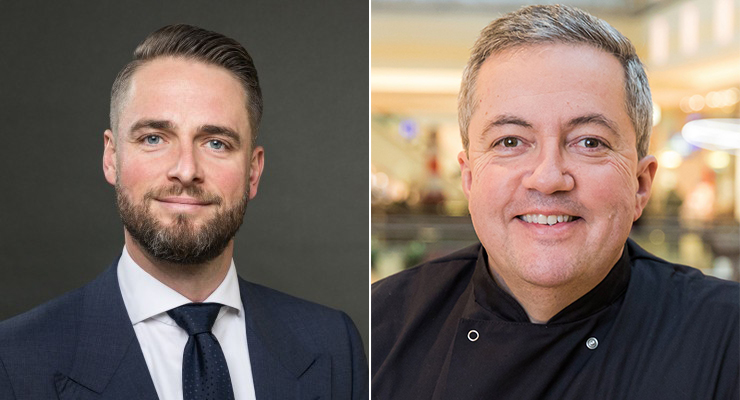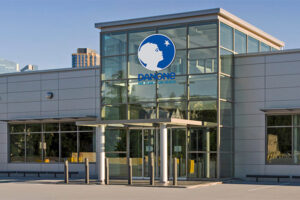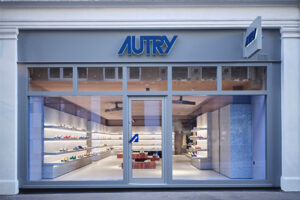ACROSS: WHAT IS THE MOOD AT POTSDAMER PLATZ RIGHT NOW?
JONATHAN DOUGHTY: No, The Playce shows the power of optimism. Undoubtedly, it was challenging to deliver a project that started before COVID-19, face all the challenges that came along with the pandemic, and still have the will, desire, and financial backing to deliver this project post-COVID. The result is splendid, and I’m super optimistic about all the decisions that we’ve made along the way.
ACROSS: WHAT DECISIONS WERE MADE?
DOUGHTY: First, Brookfield Properties decided not to create just another shopping center. What did that mean in practice? It meant elevating the role of leisure and food in the area and focusing on experiential retail and leisure. All of those decisions were made before we knew about COVID-19, and they’ve proven to be the right ones. When all the shops had to be closed, Brookfield Properties used that time to pro- actively complete renovations and upgrades. Since then, the knock-on effects of COVID-19 have been complex for the broader retail market, but what we created in Berlin has proven to be the right concept.
ROGER GOYK: We wanted to be different right from the beginning. Berlin is the capital of shopping centers, so there was no need for just another outlet in a saturated market. We began construction in April 2020 and finished in September 2022. The project is gaining momentum with every passing week, and more and more consumers and retailers recognize that The Playce is a unique destination, providing products and experiences that can’t be replicated elsewhere.
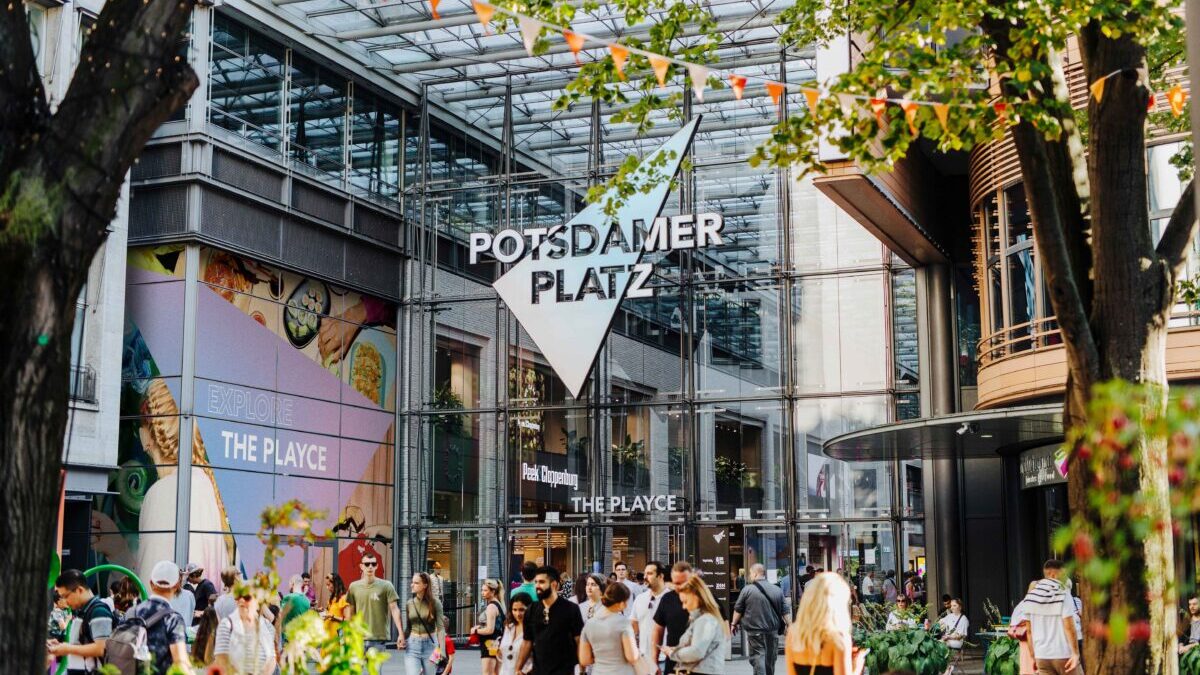
ACROSS: WHY DID YOU CREATE THAT PARTICULAR CONCEPT AT THAT LOCATION?
GOYK: There was no need for just another shopping mall in Berlin. We would not have been able to achieve sales growth if we had delivered a revamped, but ultimately conventional, retail location. That’s why we focused on creating space for new experiences in Berlin where people can have fun. Over the last few decades, Potsdamer Platz has primarily been seen as a shopping district, but it’s near many of Germany’s leading cultural institutions and historic locations, such as the Philharmonic Hall, the new National Gallery, the Holocaust Memorial, and the Brandenburg Gate. Yes, we are also a fashion destination, but it is so much more. We want Potsdamer Platz to be an essential part of the fabric of Berlin, so people, drawn to the city’s world-class museums and art galleries, decide to spend several hours at Potsdamer Platz enjoying the leisure activities and great restaurants.
ACROSS: WHAT DO YOU MEAN WHEN YOU SAY IT IS THE RIGHT CONCEPT FOR THE TIME FOLLOWING COVID-19?
DOUGHTY: The new glass roof makes people feel more like they’re outside in the sun rather than inside a closed shopping center. We’ve also pedestrianized part of the surrounding area, moving all cars, taxis, buses, and delivery vehicles out of sight. We now have a beautiful triangular site that is walkable throughout the area. The transformation of The Playce during the pandemic went hand-in-hand with the wider beautification of Potsdamer Platz. Public artwork, green spaces, and walkable streets are the future of successful retail destinations and have all been delivered throughout the estate by Brookfield Properties. The final elements are all coming together now – it’s the perfect time to join the project. If it were me, I would want to sign a lease now in order to open at the end of this year.
ACROSS: WHAT FEEDBACK ARE YOU GETTING FROM VISITORS AND OTHER INDUSTRY EXPERTS?
GOYK: So far, we’ve only received positive feedback. Everyone acknowledges that this is something different. Of course, there are concepts that focus on F&B, leisure, and experiential retail in other parts of the world, but for Germany, this is unique. We do not sign leisure tenants to fill gaps. We give them the prime locations. That is a huge difference to the wider market.
ACROSS: HOW WOULD YOU DESCRIBE THE PLAYCE IN A FEW WORDS?
GOYK: In hard facts, it is a covered high street. In soft facts, it is unique, fun, has beautiful architecture, and, most importantly, has something for everyone.
ACROSS: WHAT DOES THE GENERAL RENTAL CONCEPT LOOK LIKE?
GOYK: What we are establishing is focused on leisure and entertainment, which has always been a part of the fabric of Potsdamer Platz. The area is already home to the city’s biggest cinema and casino in Germany. We’re providing new and enjoyable forms of entertainment, such as The Upside-Down Museum, a Dutch concept that provides spaces for people to take creative photos, and the disruptive new arrival in Berlin’s art scene, NOTAGALLERY, which has opened a venue. Challenging convention is the name of the game at our new restaurants and bars – places like The Alchemist give people showmanship and theater alongside great quality cocktails. Regarding “traditional” retail, our idea was to eliminate “ordinary fashion” on the upper levels. Roughly speaking, there are two rules for fashion retailers: The tenants must either be unique in Berlin or provide a unique concept. We don’t want to see the same stores that have been established at other centers.
ACROSS: CAN YOU GIVE AN EXAMPLE OF THIS UNIQUENESS? HOW DO RETAILERS, ESPECIALLY FASHION RETAILERS, FOLLOW THIS ENTERTAINMENT APPROACH ON THE FLOOR SPACE?
GOYK: One example is our NBA Store, which sells basketball merchandise and clothes. You won’t find anything like it anywhere else in Berlin. Not only can you buy merchandise products there, but you can also play basketball, and the staff members share the customers’ love and passion for the sport. Another great example of how established stores embrace our unique concept requirement is Peek & Cloppenburg. Of course, Peek & Cloppenburg is a fashion chain that has stores in many shopping centers, but for Potsdamer Platz, they created the first and only “Conscious Fashion Store”, which focuses on sustainable fashion. They offer sustainable products, bring the topic to life in their store design and furniture, educate people about the subject, and even hold panel discussions. There is an atelier inside where people can personalize their products. This is something new and might be surprising for some customers.
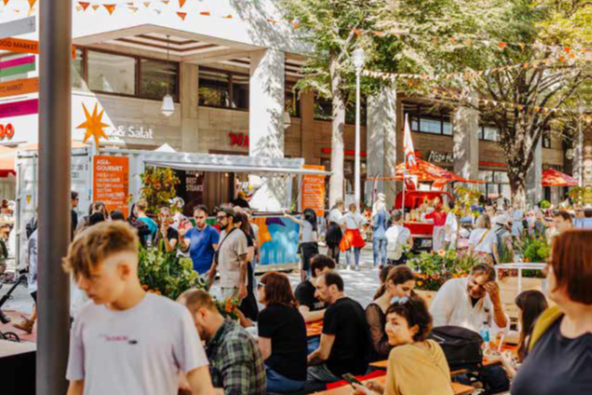
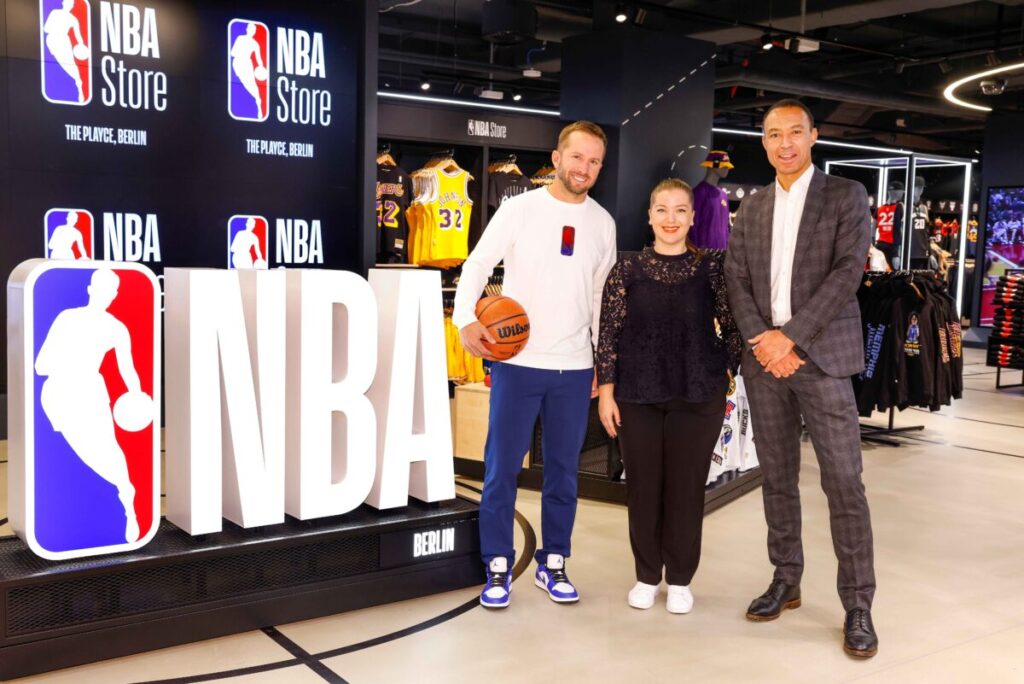
ACROSS: WHAT LEISURE AND F&B INDUSTRY CONCEPTS CAN WE EXPECT AT POTSDAMER PLATZ?
GOYK: We are delighted to announce that we’re 96% leased. Most of the places are open – Mattel will be the last big one to open at the end of this year. If I were to sum up the philosophy uniting the various brands at Potsdamer Platz today, they tend to focus on new experiences and providing joyful experiences. Take Manifesto Market, one of our anchor tenants, which opened its first location in Germany, at The Playce. The venue is the largest food hub in Germany and is a place where families and friends can enjoy great food from around the world. Or, The Alchemist and Lane7: We wanted to bring those two British brands to Potsdamer Platz, because they deliver traditional products with a twist. The Alchemist specializes in cocktails but adds theater and joy to the delivery of the drinks, while Lane7 brings a party atmosphere to bowling. A new sneaker concept from central Europe, “The Streets”, shows how retail and leisure increasingly overlap at Potsdamer Platz. They’ve signed up for 160 sq m of space, and together we are building basketball courts for the community on one of our side streets. Of course, we don’t earn money with basketball courts, but they bring people together.
ACROSS: WHAT DOES YOUR TARGET GROUP LOOK LIKE?
GOYK: Fifty percent of our visitors are locals; 50 percent are tourists. Half of the tourists are international; the other half come from various parts of Germany. For us, it was vital that the area appealed to visitors while remaining a practical location. Potsdamer Platz has a mixture of office tenants, residents, and visitors, and we’ve ensured entertainment is mixed with practical daily outlets.
ACROSS: COMMUNITY BUILDING IS AN ESSENTIAL TOPIC FOR YOU. YET, HOW DO YOU BUILD A COMMUNITY WHEN 50 PERCENT OF IT IS IN A CONSTANT STATE OF CHANGE?
DOUGHTY: The core of the community is fixed with people who live and work here or nearby, and the other half are in transit. Successful places are precisely this: You have your core community, and then you have lots of people who want to be part of this community for a period of time. The core community is what draws those tourists in.
GOYK: The tourist community is the biggest community you can have. Everybody posts everything they’ve experienced, what they’ve eaten, and who they’ve met, especially when travelling. When they are at The Playce, they’re part of the community, and they’re often our best marketers.
ACROSS: FIFTY PERCENT TOURIST SHARE IS UNUSUAL FOR A SHOPPING CENTER. WHAT DOES THAT MEAN FOR YOUR MARKETING APPROACH?
GOYK: We are delighted to announce that we’re 96% leased. Most of the places are open – Mattel will be the last big one to open at the end of this year. If I were to sum up the philosophy uniting the various brands at Potsdamer Platz today, they tend to focus on new experiences and providing joyful experiences. Take Manifesto Market, one of our anchor tenants, which opened its first location in Germany, at The Playce. The venue is the largest food hub in Germany and is a place where families and friends can enjoy great food from around the world. Or, The Alchemist and Lane7: We wanted to bring those two British brands to Potsdamer Platz, because they deliver traditional products with a twist. The Alchemist specializes in cocktails but adds theater and joy to the delivery of the drinks, while Lane7 brings a party atmosphere to bowling. A new sneaker concept from central Europe, “The Streets”, shows how retail and leisure increasingly overlap at Potsdamer Platz. They’ve signed up for 160 sq m of space, and together we are building basketball courts for the community on one of our side streets. Of course, we don’t earn money with basketball courts, but they bring people together.
ACROSS: WHAT DOES YOUR TARGET GROUP LOOK LIKE?
GOYK: Fifty percent of our visitors are locals; 50 percent are tourists. Half of the tourists are international; the other half come from various parts of Germany. For us, it was vital that the area appealed to visitors while remaining a practical location. Potsdamer Platz has a mixture of office tenants, residents, and visitors, and we’ve ensured entertainment is mixed with practical daily outlets.
ACROSS: COMMUNITY BUILDING IS AN ESSENTIAL TOPIC FOR YOU. YET, HOW DO YOU BUILD A COMMUNITY WHEN 50 PERCENT OF IT IS IN A CONSTANT STATE OF CHANGE?
DOUGHTY: The core of the community is fixed with people who live and work here or nearby, and the other half are in transit. Successful places are precisely this: You have your core community, and then you have lots of people who want to be part of this community for a period of time. The core community is what draws those tourists in.
GOYK: We don’t do the typical shopping center marketing activities. We focus on social events a lot. We organize summer activities, flea markets, food truck festivals, etc. Of course, getting to know our visitors has taken time, and we’ve taken what we’ve learned from each one to improve in the future. Through this trial and error, we’ve hosted some wonderful events. Due to the area’s transformation, Potsdamer Platz is now a popular destination for families. In the past, Potsdamer Platz was considered to be a hectic, busy place that was not associated with children and families. Now, all family activities are exceptionally well received. In Germany, shops are closed on Sundays, but restaurants and entertainment venues remain open. Families like to come with their children and spend time at The Playce, especially on the weekends, because it’s a safe, traffic-free space with lots on offer for them.
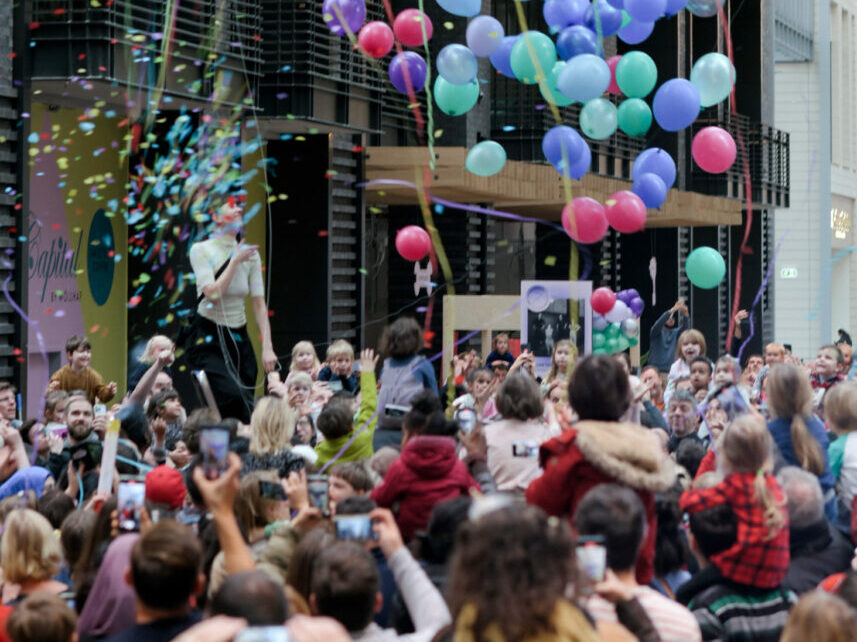
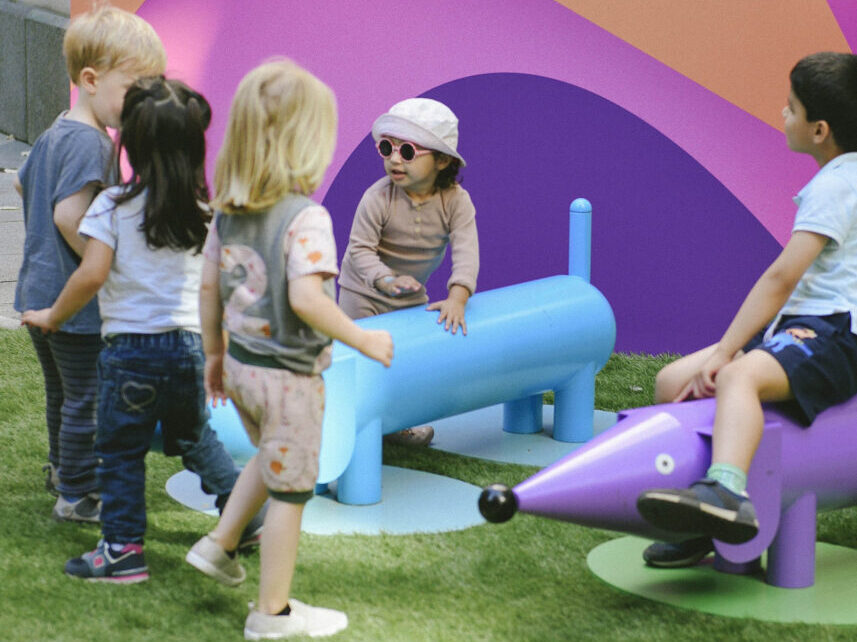
ACROSS: A PLACE LIKE THIS ALSO NEEDS A DIFFERENT MANAGEMENT STYLE.
GOYK: That is true. The advantage is that we have Brookfield Properties, with its international portfolio. We can learn a lot from projects in New York, Dubai, London, or Toronto on how to create attractive places for locals and tourists. And with ECE, we have a highly professional partner who knows how to manage local centers. We work very closely together.
ACROSS: JONATHAN, YOU HAVE ALREADY PLANNED MANY F&B CONCEPTS FOR ECE. WHAT IS SPECIAL ABOUT THIS ONE?
DOUGHTY: It’s like every project I’ve done in Germany, but much better. Curating a successful F&B offer is all about how the different concepts fit together. The Brookfield Properties team is wonderful to work with because they have all the international experience. They know exactly what kind of tenant, what type of food, and what style of service is needed to fill a gap. Filling the matrix for The Playce is much more complex than a “normal” shopping center. When I came to Potsdamer Platz, I immediately saw a need at the back end of the center for F&B. It was the entry and exit for the offices, and I said, “These tenants need to eat and drink.” But, in Germany, nobody wanted to fill this gap. We went to potential tenants, but they could only offer regular cafés or restaurants – nothing that moved the dial. Then, I started hunting abroad. For example, I’ve known the team from The Alchemist for quite a while and convinced them that now is the right time to land in Germany.
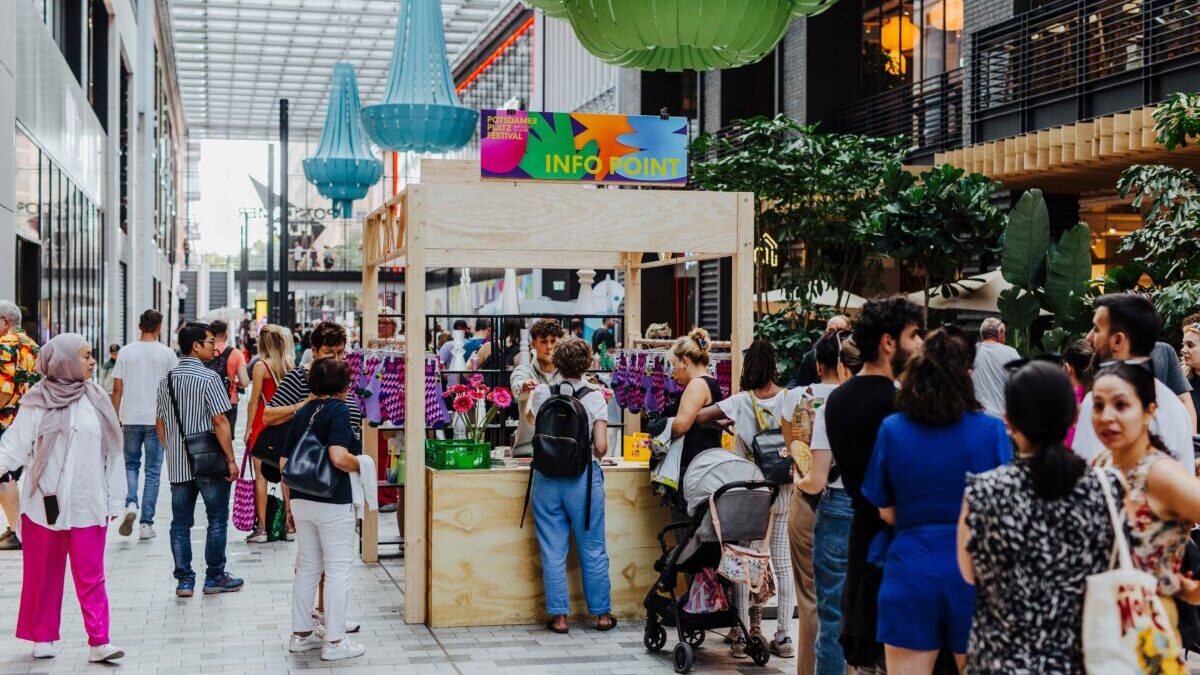
ACROSS: WHAT DOES A CONCEPT LIKE THIS MEAN FOR THE CLASSICAL BUSINESS MODEL? DO YOU STILL TALK ABOUT RENT PER SQUARE METER OR TURNOVER RENTS, OR DO YOU HAVE TO BE MORE CREATIVE IN THAT REGARD?
DOUGHTY: A new concept needs new business models. Brookfield Properties was very flexible and designed contracts individually, depending on what made sense for both sides. We work very closely with the tenants. That applies, for example, to technical assistance and even more so to assistance on opening in Germany. The latter is critical when you enter a new market.
GOYK: Ultimately, we have a straight lease with a fixed rent and a turnover component for all tenants. Our strength is that we highly believe in the project’s success and provide a lot of support at the beginning, so nobody fails. Tenants like Paulaner and Burgermeister are proof of this close cooperation. Both opened during the pandemic – the most challenging time to open an outlet – but they are still here and making significant turnovers.
ACROSS: IS YOUR CONCEPT THE FUTURE OF HOW TO CREATE A “VIBRANT PLACE”?
GOYK: Each project will come with its own set of unique needs; you must analyze your location. We have done extensive research, and it took us two years to find the concept and uncover what could or couldn’t work. It’s not a one-size-fits-all solution, and a focus on entertainment and leisure is not a general solution to empty retail space. That’s the challenge – it’s not just about combining F&B, leisure, and retail: It must be the right concept for the specific target group, perfectly combined. More importantly, it is not static. It’s fascinating to see when you open something new, which slightly changes the whole and what you will do next.
DOUGHTY: It’s like a recipe. You think you created a recipe, but then you add a little salt and spices, giving you new ideas. It’s crucial to live and breathe in a place. Whenever I am in Berlin, Roger and I stroll around The Playce. We immerse ourselves in the atmosphere, smell it, watch it, and see how people behave.
ACROSS: YOU ARE PAINTING A VERY OPTIMISTIC PICTURE. THE RETAIL MOOD IN GERMANY IS SOMEWHAT GRAY. HOW DO YOU DEAL WITH THAT, ESPECIALLY WHEN YOU HAVE TO CONVINCE STAKEHOLDERS AND BUSINESS PARTNERS?
DOUGHTY: Yes, we are very optimistic, but it isn’t unquestioning optimism. The challenge is that an eternally pessimistic property industry needs people like us to do things differently. It’s appropriate to be pessimistic if we stick to the old rules of the 1990s. You must talk to the guests and listen to their needs. They’re the people with the money in their pockets, not the investors or landlords. We must be more in tune with the people on the street rather than the spreadsheet.
Learn more about Berlin´s unique retail destination: “How Potsdamer Platz Attracted Global Brands“ – The secret to a thriving retail destination lies in the art of curating a unique combination of retailers set against aesthetic backdrops with a blend of loyal customers, brands, and events that consistently attract new visitors. This is no easy feat in the competitive European market. Find out more about how Potsdamer Platz has been elevated to its current status, and how “The Playce” contributed to it.
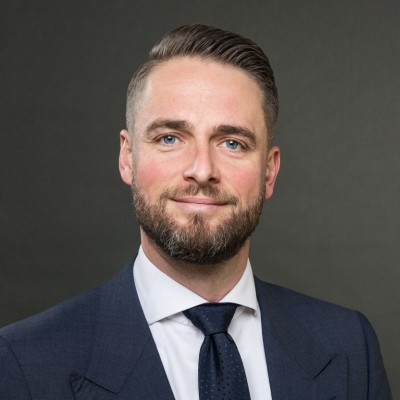
Roger Goyk
Roger Goyk is the Director of Retail Brookfield Properties.
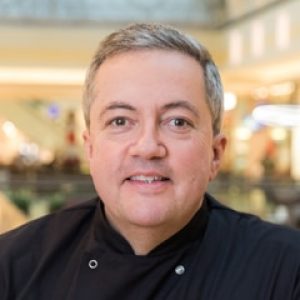
Jonathan Doughty
Jonathan Doughty is the Special Project Manager at ECE.

